In Japanese, ore 俺 means "I" or "me." It's a masculine first person pronoun, used mostly by men, and the pronoun that most men use. It's considered rude and arrogant in respectful contexts, and typically avoided with honorific speech. It's also spelled ore オレ, ore おれ.
Meaning
The word ore translates to "I" or "me" depending on whether it's the subject or object of the clause.
- ore wa Tarou
俺は太郎
I'm Tarou. - ore ni oshiero
俺に教えろ
Teach [it] to me.
Tell me about [it].- oshiero - meireikei 命令形 of oshieru 教える, "to teach."
Often you don't need to explicitly use a first person pronoun, so just Tarou desu and oshiete would have the same meaning as the phrases above.
See first person pronouns for details on grammar.
The phrase ore no 僕の means "my" or "mine."
See also: no の particle.
- ore no namae wa Tarou
俺の名前は太郎
My name is Tarou. - sore wa ore no da
それは俺のだ
That is mine.
The phrases ore-tachi 俺たち and ore-ra 俺ら mean "we" or "us."
See also: pluralizing suffixes.
- ore-ra wa kaizoku da
俺らは海賊だ
We are pirates. - ore-tachi wa kaizoku da
俺たちは海賊だ - ore-ra wo shinjiro
俺らを信じろ
Believe us.
Plural
The plural of ore is normally ore-tachi, but ore-ra is sometimes used instead. In general ~ra sounds informal compared to ~tachi. For reference, some data:
| ~ra | ~tachi | |||
|---|---|---|---|---|
| ら | 等 | たち | 達 | |
| おれ | 39 | 1 | 1094 | 10 |
| オレ | 23 | 0 | 187 | 14 |
| 俺 | 132 | 11 | 931 | 169 |
Nuances
The pronoun ore 俺 is generally associated masculinity. It's the pronoun most used by men in private contexts, but these same men may use different pronouns in business contexts, or depending on whom they're talking with.
Typically, a boy uses his own name while he's very young, like less than 3 years old, and their parents may teach him to use boku 僕, which is considered to be more appropriate for boys of that age.
Afterwards, he'll see older boys using ore and mimic that to look cooler and manlier in front of his male friends.
This varies from person to person, environment to environment, some boys never use boku, others never use ore, others use other pronouns.
It also varies from region to region, as in some regions some pronouns are more popular than others.
In general, masculine language such as ore is considered rude and avoided in contexts that demand respect. The pronoun watashi 私, which can be considered feminine in casual contexts, is used in business contexts, when talking to clients.
- Context: Miyamizu Mitsuha 宮水三葉, who is a girl, switches bodies with Tachibana Taki 立花瀧, who is a boy. Upon meeting Taki's school friends, she has trouble figuring out the appropriate first person pronoun to use as a boy.
- a... watashi
あ…私
Ah... I... - watashi?
私?
"Watashi?"- His friends look puzzled.
- watakushi?
わたくし?
"Watakushi"?- Nope.
- iya boku...
いや 僕…
Erm... "boku"?
- Nope.
- ee...?
ええ…?
Eeh...?- Hang in there, Mitsuha!
- ore....?
俺…?
"Ore"?- *nods*
Some men switch from ore to boku when in front of women, or when talking to their elders, e.g. one's mother. Although also masculine, boku originally meant "manservant," so it can be used in contexts where ore would be weird.
- Context: Gojou Satoru 五条悟, who doesn't like to obey rules, is told to obey societal norms.
- ichininshou "ore" wa {yameta} hou ga ii
一人称「俺」はやめた方がいい
[It] would be better if {[you] stopped} [using] the first person pronoun "ore."- ore - a masculine first person pronoun that's not used in formal situations.
- a´?
あ゙?
Ah?
- What did you just say to me???
- toku ni {me-ue no} hito no mae dewa ne
特に目上の人の前ではね
Specially in front of [your] superiors, [alright].- {me-ue no} hito
目上の人
People [who] {are above you}.
[Your] superiors.
- {me-ue no} hito
- {Tengen-sama ni au kamoshirenai} wake dashi
天元様に会うかもしれないわけだし
{[We] might meet Tengen-sama}, [after all].- In this series, Tengen-sama is an important person, as hinted by the fact the ~sama suffix is used with their name.
- "watashi", saitei demo "boku" ni shi na
「私」最低でも「僕」にしな
Use "watashi," at very minimum "boku," [okay].
Read the article on boku 僕 for more details about the choice of pronoun.
Extroversion
In anime, characters that use ore tend to be outgoing, energetic, and extroverted, while characters that use boku tend to be sheltered, studious, and introverted.
This is mostly because ore is acquired by being influenced by other boys, older boys, who use the pronoun, while boku is sometimes enforced by one's parents.
The character that's influenced by their parents more, that stays home more, uses boku, while the one that goes out more, and plays with his friends more, uses ore.
It's common for a series to have a main character and his best friend or rival having opposite personalities that complement each other. One extroverted and one introverted, one that likes fighting and one that likes studying, one that uses ore and one that uses boku.
- Context: the rival and the protagonist, both 11 years old, introduce themselves to each other.
- oku e ikou ka
奥へ行こうか
[How about we] go further inside?
- oku - inner part, in this case of a go parlor, as opposed to standing by the entrance.
- ikou - volitional form of iku 行く, "to go."
- boku wa Touya Akira
ボクは塔矢アキラ
I'm Touya Akira. - ore wa Shindou Hikaru
オレは進藤ヒカル
I'm Shindou Hikaru. - roku-nen sei da
6年生だ
[I] am a sixth year student.
- In this case the 6th grade of an "elementary school," shougakkou 小学校.
Arrogance
The pronoun ore 俺 can carry a nuance of arrogance.
Since most men use ore, and most male characters use ore, it doesn't make sense to say that all these male characters are being arrogant. However, if a character is arrogant and male, chances are they'll use ore, and not boku, or some other pronoun.
Usage by Girls
Some girls use ore 俺 as first person pronoun. They're called:
- orekko
俺っ娘, or オレっ娘, 俺っ子, オレっ子
An "ore" girl.
- Context: Gokuraku Nozomi 獄楽希, a monster girl that looks like a boy, checks a fashion magazine that seems to feature one of her friends in the cover.
- isso anta mo moderu φ mezashite-mitara
いっそアンタもモデル目指してみたら
How about [you] try to become a model, too?
- ~te-mitara - ~tara ~たら form of ~te-miru ~てみる, "to try to."
- ore ga?
俺が?
Me? - juyou aru to omou yo
需要あると思うよ
[I] think there's demand.- For a model that looks like a boy.
- tsuttemo ore fashon toka shiran shi
つっても俺ファションとか知らんし
[Even if you say that], I don't know [anything about] fashion.- tsuttemo - contraction of to-itte mo と言っても.
There's a boku counterpart: bokukko ボクっ娘
In English, if a girl was using male pronouns, we'd think of he/him, and conclude she, or rather, he's transgender or something like that. This isn't the case in Japanese.
Although a boy would use male pronouns to refer to himself, just using Japanese pronouns that are typically masculine doesn't make someone a boy.
It could be the girl is simply a tomboy. That she grew up surrounded by male friends and, because those boys used male pronouns like ore, she started using ore, too.
Although ore 俺 is masculine nowadays, it was originally used by both genders.(デジタル大辞泉)
One theory is that ore 俺 comes from onore 己. Due to this, in some regions of Japan it's considered normal for girls to use ore 俺, for it's considered neutral, even though in other regions it's considered a masculine pronoun.(nicovideo.jp)
In anime, girls that use ore are often tomboyish and the sort that "bests men," otoko-masari 男勝り, typically in the sense that they're strong enough to beat men in a fight, and that pronoun is a way to get guys to acknowledge her as an equal.
Alternatively, girls that look like guys, a.k,a, reverse traps, also have a male pronoun like ore as part of their design.
- In Urusei Yatsura うる星やつら, Fujinami Ryuunosuke 藤波竜之介, who was raised as a boy, uses ore.
- In Minami-ke みなみけ, Minami Touma 南冬馬, who pretends to be another character's younger brother, in spite of being an older girl, uses ore.
- Context: in order to repay a monetary debt, Fujioka Haruhi 藤岡ハルヒ has to pretend to be a boy at a high school host club, and to play the part she uses the pronoun ore 俺. Hearing her say this, the club president, Suou Tamaki 須王環, who instantly started acting like he's her father, says:
- {onna no} ko ga "ore" nante ikemasen!!
女の子が「俺」なんていけません!!
Girls shouldn't [say] "ore!"- ikemasen - literally "can't go," translates as "shouldn't."
- okaasan!!! Haruhi ga {kitanai} kotoba wo tsukau you~~!!!
おかーさん!!!ハルヒが汚い言葉を使うよウーー!!!
Mother!!! Haruhi is using {dirty} words!!!- In Japanese, it's common for words that mean "mother," like okaasan お母さん, to be used to refer to one's wife, i.e. Tamaki is referring to his daughter's mother, not to his own mother.
- okaasan? dare?
お母さん?誰?
Mother? Who [is it]? - ore ka ne... nantonaku
俺かね・・・なんとなく
Me, [I think]...- nantonaku - it just feels like it's so, used when you feel something is true for some reason or another, but you can't say exactly why you feel like that.
- Although, in this case, it would be because Ootori Kyouya 鳳鏡夜 is the vice-president of the club.
Usage with Honorific Speech
In general, ore 俺 isn't used with keigo 敬語, "honorific speech," which means you don't use ore together with desu and ~masu, for example.
However, some men do use ore this way.
In particular, one may combined both when talking to coworkers or subordinates, but still use polite pronouns like watashi when speaking to his superiors, manager, boss, etc.
Also, in series featuring gangs, "delinquents," yankii ヤンキー, you may have a character that uses ore because it's masculine, but also uses polite speech when talking to the leader of the gang, or to his seniors (senpai 先輩).
In this case, sometimes the character will use a relaxed form of desu/masu which is ending sentences with ~ssu ~っす instead.
- ore wa shiranai ssu
俺は知らないっす
I don't know about [it]. - watashi wa shirimasen
私は知りません
Spelling
The word ore is typically spelled either with kanji or with katakana, as 俺 or オレ. It's unlikely to be spelled with hiragana, as おれ.
The difference between these spellings is mostly aesthetics.
The normal spelling is 俺.
The オレ spelling may be used to emphasize the word, i.e. to emphasize it's a character that uses ore, perhaps because they're arrogant, perhaps because they're an extroverted teenager, etc.
Looking at it from the other side, when the character is an adult or just happens to use ore because that's the normal thing to do, then the 俺 spelling will be used.
Derived Phrases
Some phrases include the word ore 俺 in it.
この俺
The phrase kono ore この俺, literally "this me," means, basically, "not anyone else but me."
It typically denotes arrogance, expressing how important "I" am, and how something like this isn't allowed to happen to me, specifically, even if it were allowed to happen to a lesser someone else.
- Context: Vegeta ベジータ sent his underling to fight Kakarot カカロット. His underling lost. Vegeta is perplexed.
- {nasakenai} yatsu da......
なさけないやつだ・・・・・・
[What a] {pathetic} guy.- Referring to a guy who just lost to Kakarot.
- masaka {ano Kakarotto aite ni kono ore ga wazawaza ugoku} koto ni naru towa na......
まさかあのカカロットあいてにこのオレがわざわざ動くことになるとはな・・・・・・
[I'd never have thought that] [something unlikely like] the situation ending up in such way [that] {this me would have to act against that Kakarot} would happen.
- I didn't expect I, of all people, would have to fight him, that my underling would lose and I'd have to act. Inconceivable.
This phrase also occurs with other pronouns, e.g. kono boku, kono watashi, but kono ore is more common, simply because characters that use ore tend to be more arrogant.
俺様
The phrase ore-sama 俺様 adds the ~sama ~様 honorific suffix to oneself. If someone did this in real life it would sound very cringe, but in anime it sounds like the character is extremely full of himself.
Imagine someone saying "the great me" instead of "I" in every sentence. In any case, you'd never use a honorific toward yourself in any normal conversation.
- Context: Takamine Kiyomaro 高嶺清麿 speaks to his concerned mother.
- yakamashii'!!!
やかましいっ!!!
[You're] noisy!!!
[Stop annoying me!!!] - ore-sama ga, nande anna {tei-reberu na} yatsura to tomodachi ni nan'nakya ikenee-n-da yo'!!?
オレ様が、なんであんな低レベルな奴らと友達になんなきゃいけねーんだよっ!!?
Why do I have to become friends with {low-level} guys like those!!?- tomodachi ni naru
友だちになる
To become friends.
- tomodachi ni naru
Sometimes, both phrases kono ore and ore-sama are combined into kono ore-sama この俺様, the pinnacle of first person pronoun arrogance.
- Context: Harima Kenji 播磨拳児 is about to get violent.
- ima sara kono ore-sama no osoroshi-sa ni kidzuite-mo oso-sugiru ze...?
今さら この俺様の 恐ろしさに 気づいても 遅すぎるぜ・・・?
Even if [you finally] noticed how frightening this me is, it's [already] too late.- ima sara
今更
Only now. After all this time. Finally. - osoroshi-sa
恐ろしさ
Frightening-ness. How frightening. - kidzuku
気づく
To notice. - kidzuite-mo
気づいても
Even if [you] notice. - osoi
遅い
Late. - oso-sugiru
遅すぎる
Too late.
- ima sara
This is a moe attribute. So-called ore-sama characters are those that think they're the greatest, strongest ever, and look down at everyone else. It doesn't even matter if they use the phrase ore-sama or not. One example would be:
- Bakugou Katsuki 爆豪勝己, from Boku no Hero Academia 僕のヒーローアカデミア.
There's no such thing as boku-sama, since boku implies inferiority, and ~sama implies superiority, putting these two things together would be contradictory and nonsensical. Although perhaps someone would use it as a joke with a character that normally uses boku.
俺の嫁
The phrase ore no yome 俺の嫁 means, literally, "my wife," however, it's also a slang that means "my waifu," a "waifu" being a fictional character one would want to take as wife.
- Context: a bunch of otaku watch a mahou-shoujo TV anime.
- ichigo no akuma dete-kite nyorin
イチゴの悪魔でてきてにょりん
Come out strawberry demon nyorin.- nyorin - doesn't mean anything, used here because it's a cute way to end the sentence, a gobi 語尾.
- piroriroriroriin
ピロリロリロリーン
*weird magical sound effects* - Ichigo-tan no taan kita
イチゴたんのターンキターー
Ichigo-tan's turn came~~- ~tan ~たん - a cute honorific suffix used mainly toward moe anime characters.
- Ichigo-tan wa ore no yome
イチゴたんはオレのヨメーー
Ichigo-tan is my waifu~~ - katakatakatata
カタカタカタタ
*typing furiously*
オレオレ詐欺
The phrase ore-ore-sagi オレオレ詐欺, literally "ore ore scam," refers to a scam in which someone calls you saying:
- ore da, ore
俺だ、俺
[It] is me, me.
Making it seem that person is some well-known relative who doesn't even need to tell their name on the phone. Seriously, people, name yourselves on the phone. And then they ask for a money transfer to pay bail after a wrongful arrest or some made-up story like that.
Since some men use other pronouns, like boku, it wouldn't work all the time, however, most men use ore, hence why ore is used, and why the term is ore ore sagi, not boku boku sagi ボクボク詐欺.
It's not called watashi-watashi sagi ワタシワタシ詐欺, either, since a man on the phone talking to his family wouldn't normally use the watashi pronoun.
オレっ娘
The phrase orekko オレっ娘, as mentioned previously, refers to a girl that uses ore 俺 as first person pronoun.
References
- 俺 - デジタル大辞泉 via kotobank.jp, accessed 2021-03-30.
- オレっ娘 - dic.nicovideo.jp, accessed 2021-03-30.
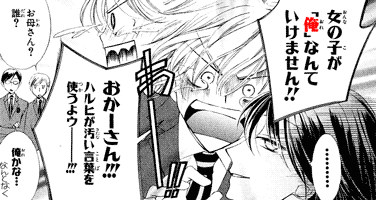
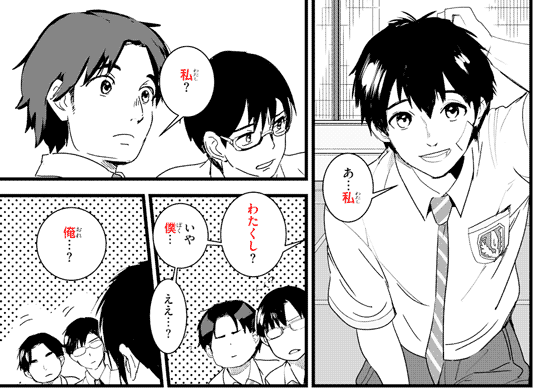
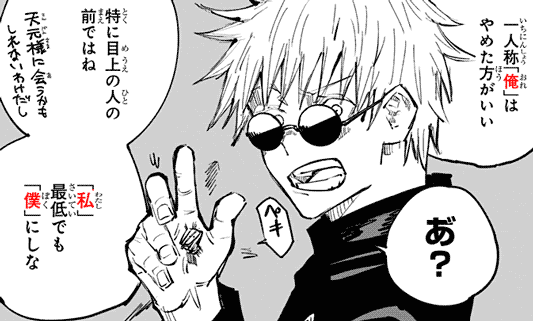
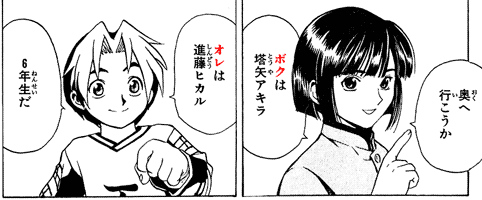
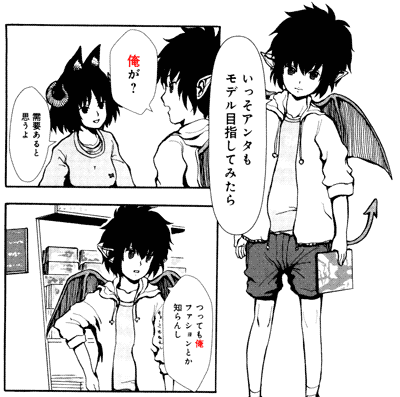
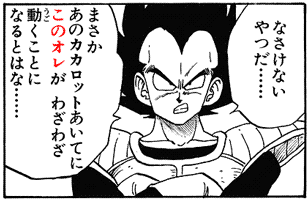
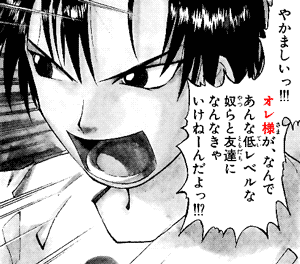
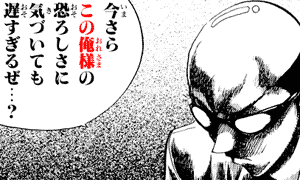
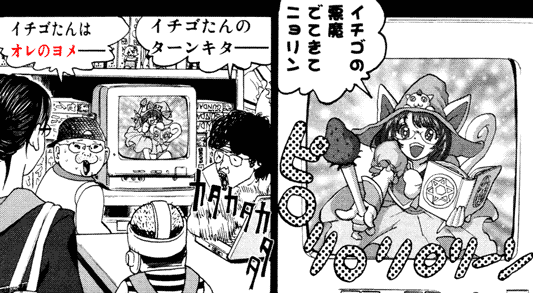
No comments: